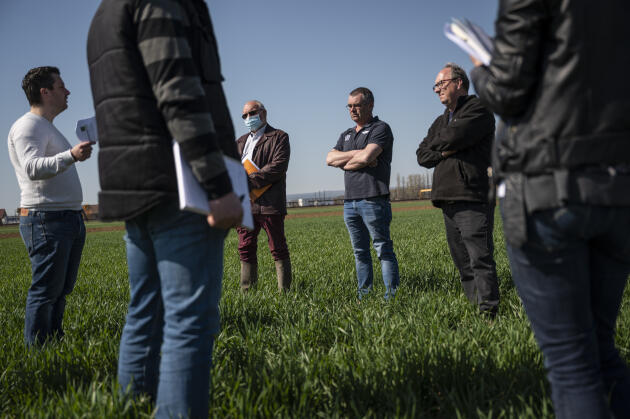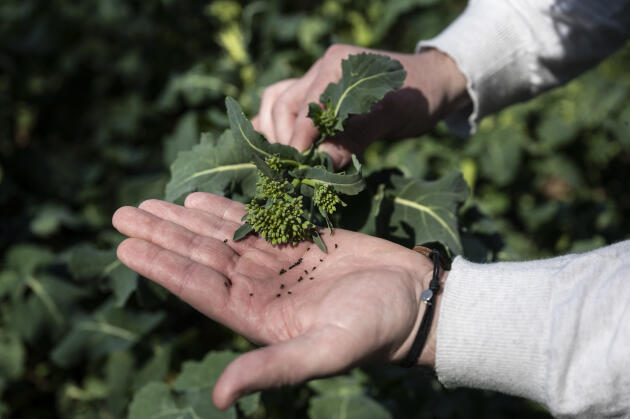ReportageScientists from the National Research Institute for Agriculture, Food and the Environment (INRAE) are conducting a unique experiment in France. On a 132 hectare farm in Côte-d’Or, they test agroecological systems with zero phytosanitary products in real conditions.
–
Armed with a round net attached to the end of a stick, Antoine walks into the middle of the rapeseed field and swings his large dip net from left to right, level with the still green plants. Contrary to appearances, the 25-year-old research technician does not go hunting for butterflies, but tries to catch beetles to count them. These insect pests eat rapeseed buds before they hatch. During our on-site visit at the end of March, their yellow flowers had not yet covered the Burgundy landscape, but the threat was already hanging over the plot, which had not been treated with insecticide.
The scene would be unusual on a typical farm, but is part of the daily life of the domain of Epoisses, located south of Dijon. This experimental farm belonging to the National Research Institute for Agriculture, Food and the Environment (Inrae) is the first of its kind to use no pesticides. On its 132 hectares, some twenty scientists continuously analyze a variety of agroecological systems, with multiple combinations of crop rotations, cohabitation of animal and plant species, and measure their results in terms of yields, economic profitability and of biodiversity.
Ecological challenge and political issue


Launched in 2018, this research platform is called “CA-SYS”. A reference to blackcurrant, a local specialty, but above all the English acronym of “Co-constructed agroecological system”. The experiment, carried out over ten years, aims to test the replacement of phytosanitary products by an improvement of animal and plant biodiversity at the same time as the preservation of profitability. An ecological challenge and a political stake, while Emmanuel Macron has renounced his promise to exit glyphosate before 2021 and that successive Ecophyto plans have not fulfilled their objective of reducing pesticides.
“The idea is not to demonstrate that we must do without phytos, but to anticipate what we could do if phytos are prohibited”, precise Stephane Cordeau, one of the facilitators of the platform. With other scientists and farmers, the agricultural engineer imagined in 2013 this experience which is intended to be participatory. This spring day, the researcher welcomes a stone’s throw from the estate, in the premises of the Côte-d’Or chamber of agriculture, half a dozen farmers from the region who have come to train and discuss their best practices. Thistle, datura or black grass are at the heart of the discussions. These weeds, or “weeds”, can proliferate in the absence of herbicide treatment and prevent the development of crops by providing shade or by capturing water and nitrogen from the soil.
You have 66.25% of this article to read. The rest is for subscribers only.
–


